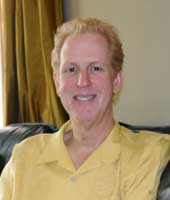“Going to an integrative oncologist won’t change your diagnosis, but it will put your body in a better place to get healthy.”
Patient Stories

Josh M
San Francisco, California
Hope and healing when there is no cure for the disease.
Two years ago, after being diagnosed with cancer, my oncologist referred me to the UCSF Osher Center for Integrative Medicine. I have a rare, slow-growing cancer called "neuroendocrine pancreatic carcinoma," which has metastasized to the liver.
During my work with Donald Abrams, MD, I discovered that integrative oncology is less about your disease and more about understanding your body. I learned ways to visualize a place hostile to cancer — the weeds in your body that are growing and crowding out healthy cells—and at the same time create a place where the healthy cells in my immune system could flourish and do their best work. These actions supported my treatment. I also learned the value of community and the importance of making sure that I was not holding on to stress or feeling isolated and alone.
Dr. Abrams will be the first to tell you — eat what your grandmother or great-grandmother ate. Just a few generations ago, the incidence of cancer was much lower. In communities that don’t rely as heavily on processed foods, the cancer rates are still at pre-WWII levels.
For a lot of people, integrative oncology is difficult because it alters the way you do certain things, diet being one. I learned to look at food as fuel, either for the good cells or the bad cells, and I developed an understanding of how certain spices, herbs and foods can actually help the immune system. I started to add supplements to my diet, slowly at first. But pretty quickly I was able to see what worked for me. I ended up with a short list, mostly turmeric, medicinal mushrooms, omega 3, D3, and probiotics. I have also incorporated weekly acupuncture, yoga and massage into my routine.
Going to an integrative oncologist won’t change your diagnosis, but it will put your body in a better place to get healthy. I have been tumor-stable for nearly two years, and my oncologist is constantly wondering if the integrative oncology helps me stay that way. I had the longest period that didn’t require Western intervention in my oncologist's experience. I went nearly 18 months before any standard therapy was used. Was it the integrative health? Perhaps.
There is a lot of talk about being at war or in battle with cancer. While the analogy works for many who are gearing up for a one-time or limited fight with cancer, the analogy does not work for those who need to treat cancer as a chronic disease. I cannot be cured of cancer (at least not in the foreseeable future), but that does not mean that I should live in a state of war with my body. That would be a stressful solution. Through integrative oncology I continue to learn how to work with my body, to be at peace with it, and to summon up energy for healing when I need it.
It is really important to recognize that this is not a cure for cancer. I did not give up on conventional medicine. Integrative oncology works together with my cancer care. It simply puts a person’s body and mind in the best shape it can be to respond well to conventional medicine and to recover from the toxicity that cancer treatment brings into the body.
The integrative approach isn’t short term. It’s about a path that will lead you to a healthier you that is better equipped to deal with the cancer. This approach is not treatment focused; it is a way of life.

